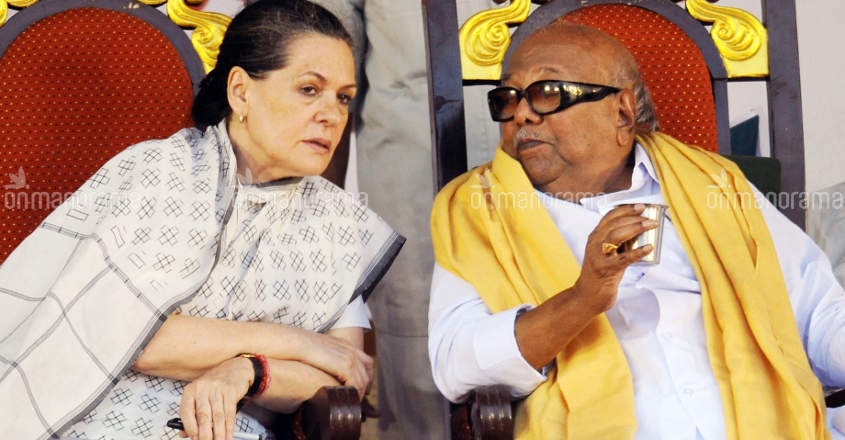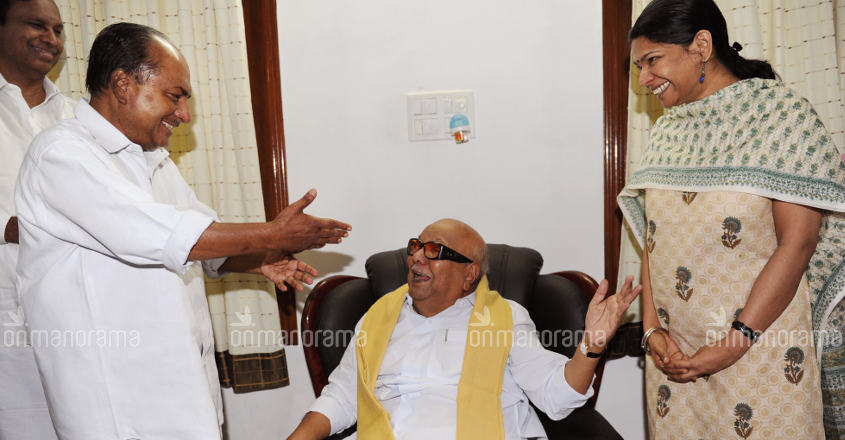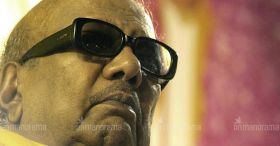
Once, as the Congress president, Sonia Gandhi strayed out of her political line to hail Muthuvel Karunanidhi as 'one of the country's tallest leaders.' It was the Dravidian icon's shrewd moves in the public arena that prompted the top boss of the grand old party to laud MK, overcoming (for a while) long years of bitter rivalry between the two outfits.
Back in his native Tamil Nadu, Karunanidhi's people had no doubt that their five-time chief minister's quiver of political strategies never came anywhere close to empty.
If a fighter who debuted as an MLA when India had its first prime minister and continued to be a powerful political rival of the Congress now headed by a great-grandson of Jawaharlal Nehru, it is only because of MK's capacity to renew his political acumen each time he faced a crisis.
Technically, he never worked in political spheres outside of Tamil Nadu, but Karunanidhi's DMK had for the last three decades been an influential force among the country's rulers in the national capital.
From 1989 onwards, his Dravidian party had been part of a clutch of central governments — be them under the National Front, United Front, the BJP-led NDA and the UPA headed by the Congress.
MK was primarily a political pupil of titan leaders C N Annadurai (who served as the last chief minister of Madras and then the first CM of Tamil Nadu for 20 days in 1969 when he died at age 59) and rationalist E V Ramasamy Periyar (who started the Self-Respect Movement seeking human rights for the subaltern people during his life between 1879 and 1973).

Soon, Karunanidhi was to fight against senior Congress leader K Kamaraj, ironically another Periyar disciple. Equally paradoxical was that MK was to also wage bigger-time political battles against one-time friends M.G. Ramachandran and J Jayalalithaa, both having been his colleagues in Tamil film industry.
Occasionally, MK was left alone on the political arena but he fought it out alone — and successfully at that. Karunandhi ended up become an MLA for 13 times in a political career that spanned eight decades. And for 60 years there, he stole the limelight.
In 1961, at the age of 37, he became the party's treasurer and the next year became the deputy leader of the Opposition in the state assembly, then soon the leader.
In 1967, he became a minister, two years later MK became the president of the DMK. In fact, 1969 was also when he debuted as chief minister. It took only 12 years for the legislator from an unimportant constituency to become the ruler of his whole state.
When movie stars and Dravidian leaders ruled Tamil Nadu politics by often doubling as personalities in both fields, it was basically as a successor of multifaceted Annadurai that Karunanidhi became the CM.
Soon, MK became the hero of the state's poor, who benefited from his welfare schemes implemented in a big way. Then in 1972, Tamil Nadu turned a new chapter of bitter political rivalry when MK parted ways with actor MGR, who formed the AIADMK that later got Jayalalithaa as the heir.
While MGR and Jayalalithaa did owe a fair share of their popularity to their status as superstars in Tamil cinema, Karunanidhi drew himself up the political rung with his operational skills as a talented writer that had also made him a cine personality behind the sheen of the silver screen.
Malayali-born and Ceylon-raised MGR's charisma did manage to fade Karunanidhi's political prospects as did Kannada-origin actress-danseuse-musician Jayalalithaa later, but MK outsmarted both the leaders. And that was not just by a longer existence, but real political relevance.
That is why 1948-born Jayalalithaa, despite enjoying popularity on par with his predecessor MGR who died in 1987 at the age of 70, couldn't quite outwit MK once and for all. In fact, no pro-Jaya wave managed to fail MK in any assembly election he fought all his years.
It was so even in 1991, when the whole country was swayed by sympathy for the Congress party in the aftermath of the death of its leader Rajiv Gandhi, a former prime minister.
What's more, MK quit as an MLA in 1993, only to return to the assembly three years later — this time as the chief minister. The DMK has faced its worst political rout five times, but on all such occasions Karunanidhi managed to win the polls. Only twice (in such crisis-ridden times) did his electoral majority dip: 599 votes in 1980 and 890 in 1991.
The final time he became the CM was in 2006 when Karunanidhi was 82. Physical disabilities had taken stronger toll on him, yet the veteran made it to the state ruler's chair. Later, his party twice lost power to Jayalalithaa (who died in end-2016), but his 2006 political strategy was a big hit: tie up with 'like-minded' parties to form a political front that will have a 'benign' DMK at its top. So, the constituents got more number of tickets to fight the election.
Thus in that state assembly polls, the DMK contested in just 131 of the 234 seats, giving the rest to its partners in the Democratic Progressive Alliance. MK had sensed his party wasn't set to capture power on its own in 2006, thus he ensured that the constituent parties won't hanker for power once the results were declared.
Karunanidhi effected this kind of dynamics through a two-pronged strategy: give the Congress more number of seats than usual and include Pondicherry as well into the political scheme of things. That is, the Congress could support the DMK from outside in Tamil Nadu, while the prospective administrative relation would be the inverse with the case of the union territory.
MK had, towards the end of the 2001-06 AIADMK rule that was marked by no major case of scandals or crises, devised a means to counter the Jayalalithaa blitzkrieg: bring out an electoral manifesto revelling in promises of populist schemes. To that, the MGR disciple had no answer.

